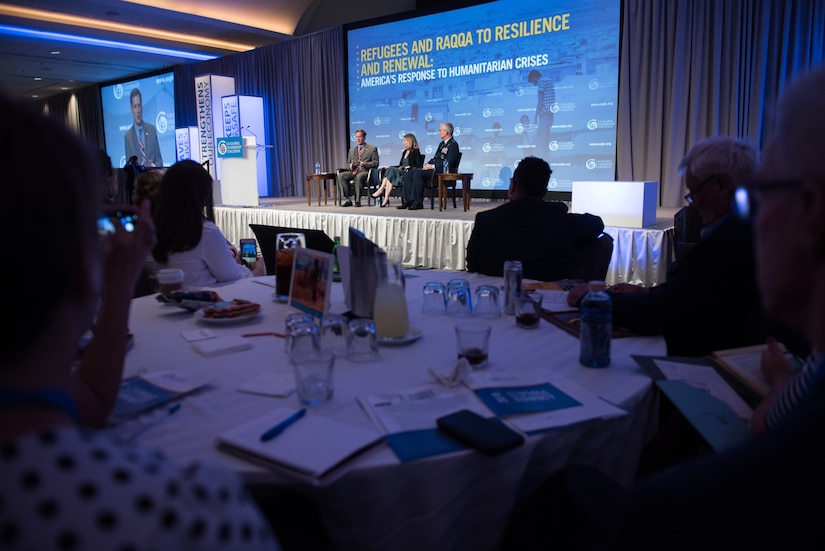By Jim Garamone, DoD News, Defense Media Activity
WASHINGTON -- The Defense Department is a resource unlike
any other in the world for aiding civilian agencies as they confront natural or
man-made disasters, and DoD continues to look for better ways to work alongside
civilian agencies, the vice chairman of the Joint Chiefs of Staff said here
yesterday.
Air Force Gen. Paul J. Selva told the U.S. Global Leadership
Coalition that DoD has learned lessons from past disasters such as the
earthquake in Pakistan, the tsunami in South Asia, the Haitian earthquake, the
Ebola outbreak in West Africa and the earthquake/tsunami that hit Japan.
Selva spoke alongside Mark Green, the administrator of the
U.S. Agency for International Development.
In humanitarian crises occurring today, with most caused by
war, 66 million people are displaced in the Middle East, Asia, South and
Central America and the Arabian Peninsula.
DoD has a national security stake in aiding other nations,
Selva said, noting that 71 years ago, Gen. George Marshall announced the
Marshall Plan, which was instrumental in rebuilding Europe in the aftermath of
World War II.
“He said if we don’t do something to stabilize Europe and
help them help themselves, that would be counter to our interests,” Selva said.
“So over a period of about four years, about $14 billion was dispersed to
governments around Europe – that’s $123 billion in today’s dollars – to stabilize
the countries that had been ravaged by war. That puts an exclamation point on
the importance of the partnership among diplomacy, development and defense.”
Green underlined the importance of close cooperation between
USAID and DoD, noting that his agency has 23 people assigned with the
military’s combatant commands. “So many of the crises we are facing, so much of
the humanitarian work that we are doing and the need that’s out there is either
conflict driven or man-made,” he said. “In order for us to get our arms around
that, if we are not partnering closely with the military, we aren’t going to be
able to achieve our goals and mission.”
Stabilization Assistance Review
Both men said they want the partnership to become closer.
The administration released a Stabilization Assistance Review this spring that
spelled out how DoD, USAID and the State Department could work together more
effectively. It drew heavily from lessons learned in Iraq and Syria and other
areas.
“The basis of the document is to define the relationships –
particularly in a crisis battlespace like Syria, like the city of Raqqa, where
the devastation is significant,” Selva said.
In those areas, it is not enough to just bring aid into the
region, Selva said. The Islamic State of Iraq and Syria left explosives and
bombs throughout Raqqa, and DoD expertise is needed before humanitarian
missions can proceed. But even in this, there is outreach, he said, because DoD
works with organizations that specialize in demining, and the department can
train local technicians to accomplish the mission. “That becomes a livelihood
for a short period of time and gives them a foundation to build on,” Selva
said.
This move does not require a formal arrangement between USAID
and DoD as a consequence of the stabilization review, so it can be accomplished
at the tactical level with little time wasted, the general said. The U.S.
military can provide security, he added, and USAID and nongovernmental agencies
can operate under that umbrella.
“They certainly give us better authorities to work in the
environment we find ourselves in today,” the vice chairman said.
Selva would like to see more sharing among the American
agencies. “There are several ways we can work better together,” he said. “One
is our relatively small footprint in many of these countries is a good set of
sensors. So there are soldiers, sailors, airmen, Marines … who are deployed
with indigenous forces in these countries, and we ought to be a feedback
mechanism … into the understanding of what is going on in those countries to
give our diplomats a bird-eye view of what is happening within those
societies.”

No comments:
Post a Comment